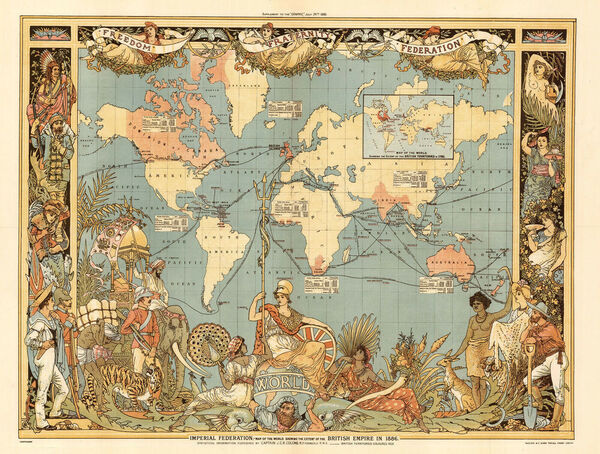While the U.S. and Europe back Ukraine, most of the southern hemisphere supports Russia
February 27, 2023
When it comes to the Ukraine-Russia war, Ukraine gets its strongest support from Europe, which has a long history of fearing Russians, and America, which has a penchant for the underdog and, possibly, has politicians with Ukrainian money lining their pockets. However, barring the New Zealand and Australian anglosphere, most of the southern hemisphere supports Russia. That is, it’s not just China that aligns with Putin; it’s almost everywhere in that part of the world.
One of the reasons that Russia’s economy is surviving despite Western sanctions is because other parts of the world are happy to do business with Russia. They’re not being forced. It turns out that those parts of the world that are not in the American/Anglo/European axis like and respect Russia. I learned thanks to a fascinating article by Krishen Mehta, “a member of the Board of the American Committee for U.S.-Russia Accord (ACURA), and a Senior Global Justice Fellow at Yale University,” who has written an essay explaining five reasons for this support.

Image: The British Empire in 1886 – one reason for lasting hostility. Public domain.
Mehta reviewed a meta-analysis of multiple surveys about different countries’ views of the conflict. He summed it up this way:
These are:
- For the 6.3 billion people who live outside of the West, 66 percent feel positively towards Russia and 70 percent feel positively towards China, and,
- Among the 66 percent who feel positively about Russia the breakdown is 75 percent in South Asia, 68 percent in Francophone Africa, and 62 percent in Southeast Asia.
- Public opinion of Russia remains positive in Saudi Arabia, Malaysia, India, Pakistan, and Vietnam.
Those are, as Mehta says, “robust” numbers when it comes to supporting Russia. He offers five reasons that could explain these attitudes. I’ve quoted Mehta’s topline arguments, and then added my own commentary. I urge you to read the original essay, though.
First, says, Mehta, “The Global South does not believe that the West understands or empathizes with their problems.”
While the West obsessea with gender, lockdowns, and climate change, the southern hemisphere lives in the real world, one of poverty (exacerbated by the craze for ESG investing), famine, and high energy prices due to war and climate change madness. A friend of mine routinely travels to Cambodia, and she says that the West’s lockdown, which ended tourism and broke the supply chain of Southeast Asian goods to America, left friends of hers so destitute she’s surprised they survived. Meanwhile, Russia, China, and India sent vaccinations to the Southern hemisphere (although much good they did).
Second, says Mehta, “History Matters: Who stood where during colonialism and after independence?”
Put another way, countries that were once European colonies still bear that resentment while feeling that it was the Soviet bloc that helped them fight back against Western colonialism. The fact that the Soviet bloc (a) helped them to destroy the free world and (b) intended to put them under the communist boot is irrelevant. What matters is that the Soviet bloc—that is, the Russians—was the agent of change.
Third, writes Mehta, “The war in Ukraine is seen by the Global South as mainly about the future of Europe rather than the future of the entire world.”
The southern hemisphere is correct. This is strictly a European war. Putin may want to fulfill the Soviet destiny of dominance across all Europe and England, but there’s no indication that his territorial ambitions extend to any part of the southern hemisphere. And again, for people who are facing daily starvation, the Ukraine-Russia war is a first-world, European problem that really doesn’t matter to them. They’d like the war to end simply to help lower prices (food, fuel, debt service, etc.) that are eating away at their scarce resources.
Fourth, “The world economy is no longer American dominated or Western led and the Global South does have other options.”
I have nothing to add to that. It’s self-evident and self-explanatory, although Mehta offers lots of data to support it.
And fifth, Mehta writes, “The ‘rule based international order’ is lacking in credibility and is in decline.” In a nutshell, it’s the hypocrisy that sees the West, especially America, changing the rules for itself as it goes along. As Mehta says,
For decades now, for many in the Global South, the West is seen to have had its way with the world without regard to anyone else’s views. Several countries were invaded at will, mostly without Security Council authorization. These include the former Yugoslavia, Iraq, Afghanistan, Libya, and Syria. Under what “rules” were those countries attacked or devastated, and were those wars provoked or unprovoked?
The West’s fondness for sanctions isn’t appreciated either, again considering the poverty and famine that dog the southern hemisphere.
Back in 1985, when there was a famine in Ethiopia, a lot of rockers got together to sing “We Are The World.” It wasn’t true then, and it’s less true now. We are not the world, and our concerns do not match those in the southern hemisphere, while our quarrels hurt them badly.
If you experience technical problems, please write to helpdesk@americanthinker.com
FOLLOW US ON
This article has been archived for your research. The original version from American Thinker can be found here.



